The Marketing with Purpose Playbook
Purpose has never been more important to how brands engage with people than it is today. We want to propose a change to the way marketers approach marketing. That it’s not about the four Ps of price, place, product, and promotion. That before the four Ps are determined, there is a more important ’P’ that needs to be decided. That ‘P’ is purpose. We’ll go even further to say that purpose is more important in driving business results than the other four Ps.
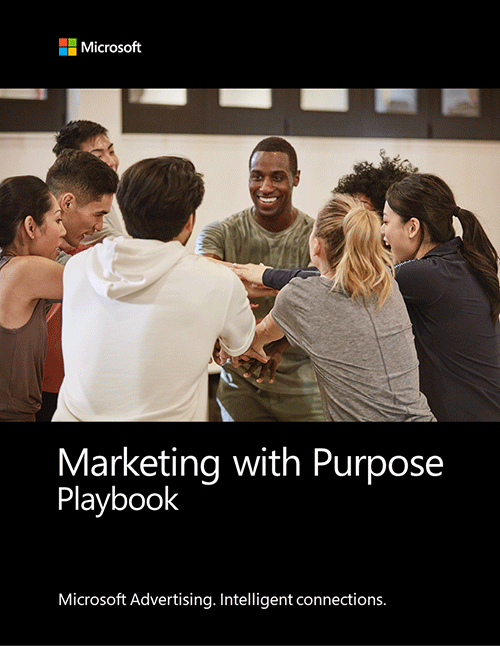
It doesn’t matter what you sell — from a commodity product like paper towels or gas, to a lifestyle brand like Nike — every brand has the opportunity to connect with people through purpose.
Being purposeful as marketers goes beyond what you may think of as the traditional cause marketing strategies. The definition of purpose is “the reason for which something is done or created or for which something exists.” Marketers need to challenge themselves to start with purpose and let that lead their marketing strategy and in turn, their advertising.
Authenticity is the most important attribute to brand performance
Before 2020, many marketing organizations were at various stages of their journey of purpose-led marketing. Microsoft Advertising has been supporting our clients on their journey through research, inclusive marketing strategies, and insights from Microsoft’s own experience.
That journey has led us — Microsoft Advertising — to the Marketing with Purpose Playbook based on our further deep dive in consumer research about the impact of purpose on building customer trust, and increasing brand performance and advertising results. This work has allowed us to support our clients in a tough year where economic uncertainty, health and safety concerns, inequality, and social injustice have changed the dialogue brands are having with people, and what people expect from those brands in to stand for something larger than just their product. We’re grateful for partnerships with advertisers and agencies, which have inspired our research work and have propelled our ability to help brands navigate these times.
In our consumer research studies on Accelerating Brand Performance through Building Trust, Increasing Brand Love and Loyalty and The Psychology of Inclusion and the Effects in Advertising, we found that purpose-led brands are more trusted and loved, and trust is critical to purchase consideration.
85% of consumers say they’ll only consider a brand if they trust the brand.
There are varying degrees of trust. People still do business with companies they may not necessarily trust 100% — think companies that dominate a market or provide convenience or savings, and for whom there is limited direct competition. However, our research showed that as trust in a brand increases, so does people’s expression of love for that brand. Brand love becomes loyalty when people see a brand 'stand for their beliefs' and when a brand 'is for someone like them.’ So, trust is important to building loyalty, and the key brand attribute to making progress towards loyalty is being genuine and authentic.
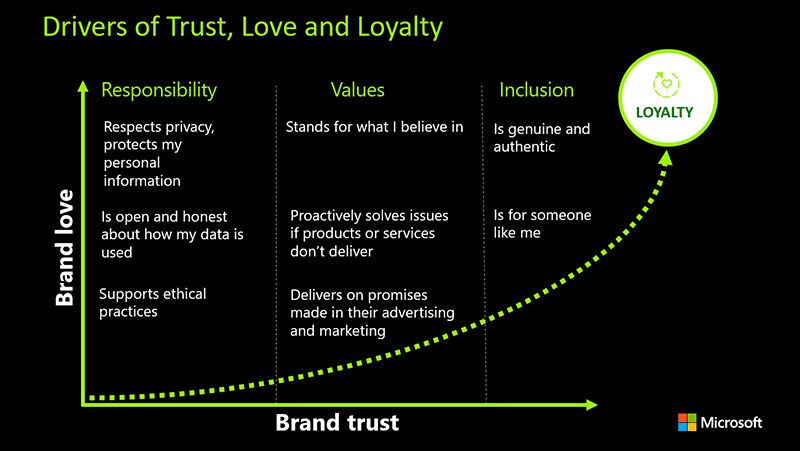
Source: The Acceleration of Brand Performance through Trust, Love, and Loyalty. Microsoft Advertising Research 2019.
“Is genuine/authentic” was rated as the most important attribute at 19 points above average with building trust.
Microsoft Advertising has developed this playbook to help marketers adopt a Marketing with Purpose mindset and learn what actions they can take to create a trusted brand that people are passionate about.
3 strategies in the Marketing with Purpose Playbook to ignite customer passion
Here are the three core building blocks to Marketing with Purpose that we’ll cover in the playbook along with how the 5 inclusive consumer mindset shifts support them:
- Responsibility: How marketers can be responsible stewards of the customer experience
- People want truth: Trust isn’t static, and businesses must put long-term strategies in place to maintain trust and inspire customer advocacy. Transparency is key to authentic brand experiences.
- People want equitable experiences — not just compliance. Focusing on accessibility is imperative and creates new opportunities to be fair and equitable to all customers.
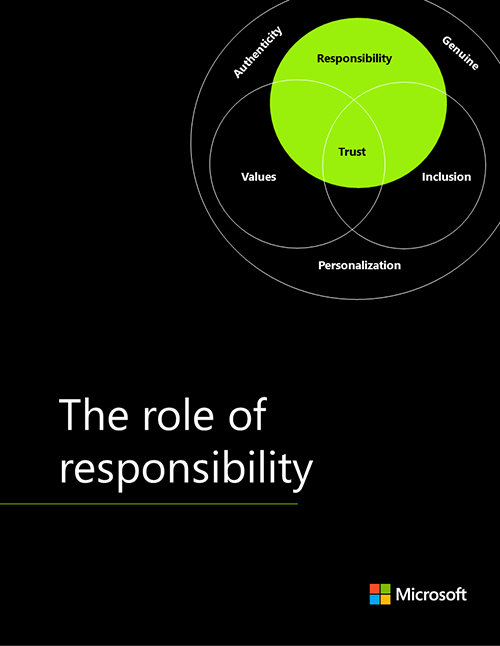
- Values: values drive value
- People want positive-impact products, not cheap unsustainable ones.
- People want brands that take a stand, not just play it safe.
You can create more authentic connections by making sure that what you’re selling, and the brand you’re representing, is just right for your customer by highlighting shared values.
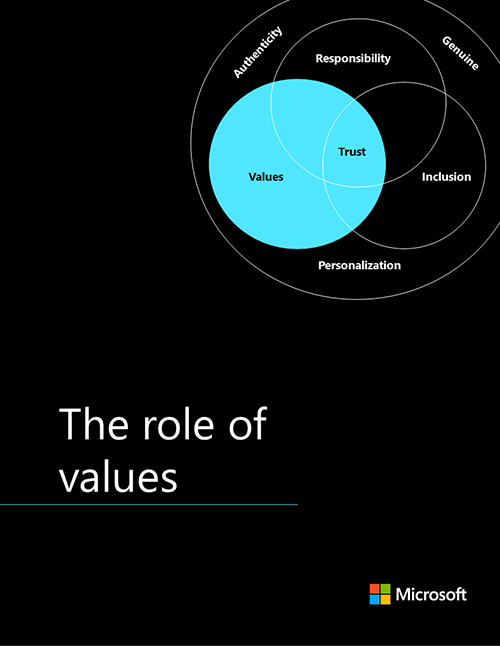
- Inclusive Marketing helps your brand connect authentically and drives trust
- People want inclusion — not just to be included.
Inclusion is the key to ensuring your advertising properly reflects people and their values in a genuine and authentic way. It’s not just doing multi-cultural marketing. It goes much deeper. You need to think about what you market, to whom you market, and how you market with an inclusive lens.
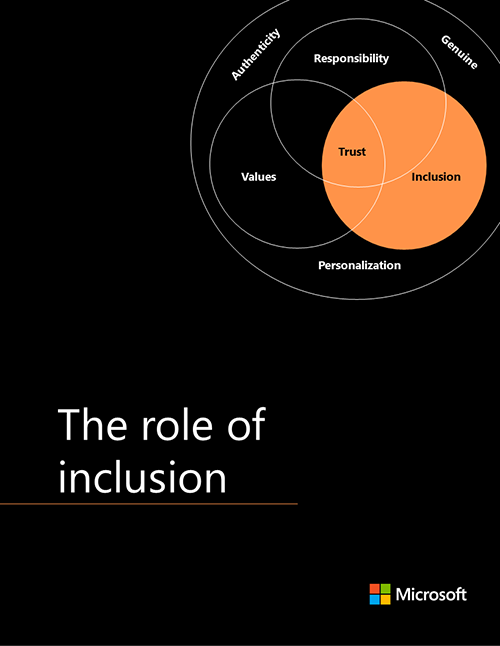
- People want inclusion — not just to be included.
What this means is that inclusion needs to be the guiding principle that inspires companies to re-evaluate their products, services, and experiences for all people. It’s a mindset shift from being product-centric, viewing how your products and services appeal to your customers, to becoming more people-centric, viewing the diverse values of all people and how your purpose aligns, which guides how you serve them.
Inclusion is not a marketing campaign. It’s in everything we do.
— Heidi Cooley, Head of Global Marketing, Crocs
The global shoe company Crocs, the maker of the iconic, classic clog, is a brand that listens and responds one-on-one to their fans. It’s a muscle they have built up over the past few years which began by responding to fans’ product requests, whether students needed classics for prom, or graduating seniors wanted matching Crocs. As Crocs began dealing with the impact of COVID, like all companies that have had to re-invent their customer journeys, they learned their most valuable lesson: they strengthened their muscle around listening to what their customers value. According to Heidi Cooley, Crocs Head of Global Marketing, the most important program Crocs has done to date is their ‘Free Pair for Healthcare.’ “Our healthcare heroes started reaching out to us as they needed a shoe that was easy to clean, easy to take on and off, and comfortable,” Heidi shared. Within five days of receiving requests, Crocs launched a global initiative, giving away 860,000 pairs of Crocs valued at over $40 million.
That program has led Crocs to a more authentic approach in their marketing. The heart of that, according to Heidi Cooley, is inclusion. “Inclusion is not just a marketing campaign. It's in everything we do, how we treat each other as employees, and it's how we come to life every day with fans around the world.”
This same approach led to another successful program — a collaboration with Ruby Rose, actress and LGBTQI+ advocate who designed a shoe for PRIDE. Heidi Cooley shares that “every collaboration comes from a place of authenticity. Ruby Rose was already a fan of Crocs and she recognized the alignment of Crocs’s brand manifesto, ‘Come as You Are,’ with her values. These programs have helped Crocs build incredibly good will with fans that believe in our vision.”
Inclusion increases advertising performance and purchase intent
When asked how Crocs has been doing since COVID, and lessons learned from these programs, Heidi shared that “their second quarter (of 2020) has exceeded all expectations. Doing the right thing for our fans is the right thing for Crocs."
When marketers view their purpose through a more inclusive lens, they come across as more genuine and authentic in their advertising, which impacts advertising performance and purchase intent.
- 63% of people in our survey say brands representing diversity in ads are more authentic.
- 72% of people said they are more likely to support brands that are authentic in their advertising.
When we compared ads that consumers deemed ‘non-inclusive’ and ones they said were ‘inclusive,’ the inclusive ads had a much bigger lift in purchase intent, with the highest performing ad seeing a 23-point lift. People said that it made the brand feel more genuine and authentic.
Learn how to create an authentic and genuine brand experience that ignites passion and trust with the Marketing with Purpose Playbook.
You can download our Marketing with Purpose playbook (aka.ms/MarketingWithPurposePlaybook), an in-depth, step-by-step guide for helping you implement these three strategies and mindset shifts. We include the findings from our research studies and break down topics like the importance of privacy, accessibility, sustainability, advertising ethics, brand and consumer values, and inclusive advertising strategies.
Also, check out our new video series ‘The Download.' We have an entire monthly segment on Marketing with Purpose with insights in our Inclusive Marketing Lab, interviews with Good is the New Cool author Afdhel Aziz, and Crocs Head of Global Marketing, Heidi Cooley.
No matter what stage you are in on your journey, invest in truly understanding people — go deep into diversity and be open to uncovering new insights and finding new audiences you may not have considered before. When you understand peoples' values, and you evaluate your brand’s purpose for how you can support those values, you find the sweet spot of shared meaning and ignite passion with your employees and your customers.
Join us on this journey of Marketing with Purpose.
Sources: The Acceleration of Brand Performance through Trust, Love, and Loyalty. Microsoft Advertising Research 2019; The Psychology of Inclusion and the Effects in Advertising, Microsoft Advertising Research 2020.
SEO Company in lucknow
Comments
Post a Comment